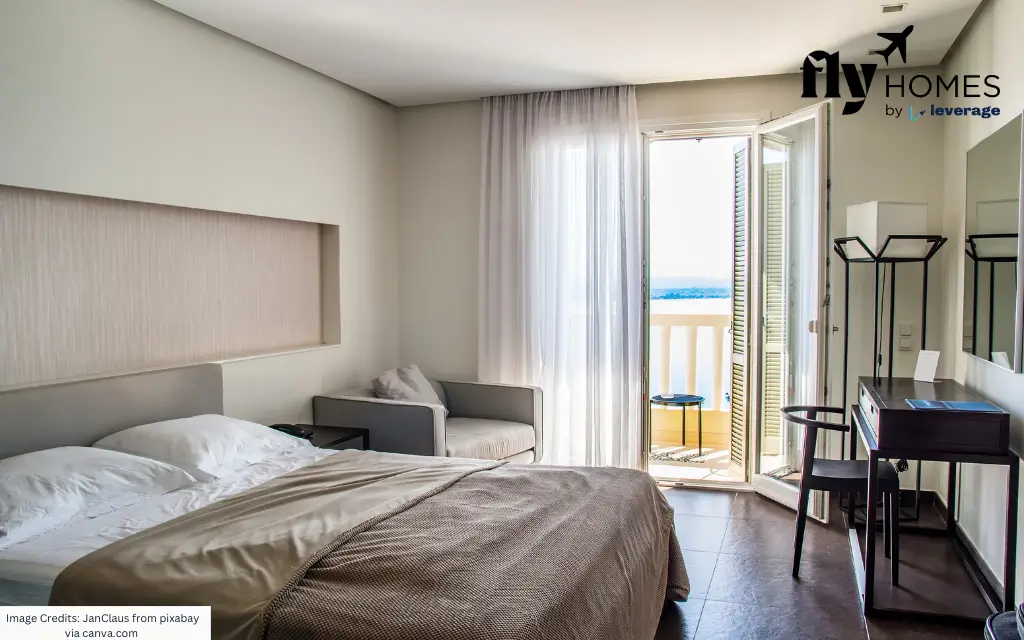For many students, on-campus accommodation is the go-to option for the first year, offering a blend of convenience, community, and safety. But is it the right choice for everyone? In this comprehensive guide, we’ll explore everything you need to know about on-campus student accommodation – from what it is, its advantages and disadvantages, to how to apply and what to expect during your stay.
Table of contents
- What is On-Campus Student Accommodation?
- Advantages of On-Campus Student Accommodation
- Disadvantages of On-Campus Student Accommodation
- What to Expect in On-Campus Student Accommodation?
- Living in On-Campus Student Accommodation
- Is On-Campus Student Accommodation Right for You?
- Tips for a Smooth On-Campus Living Experience
- FAQs
What is On-Campus Student Accommodation?

On-campus accommodation refers to housing options provided directly by the university or college for its students. These accommodations are located within or near the university grounds, ensuring students are close to their classes, libraries, and other essential campus facilities. On-campus living comes in a variety of formats, including:
- Student Halls/Dormitories: The most common form of on-campus accommodation. These are large buildings where students are assigned individual rooms, often sharing bathrooms and kitchen facilities with other residents.
- University-managed Apartments: Some universities offer apartment-style living, where students have more independence. These might include private bathrooms and kitchens shared with a smaller group of students.
- Living-Learning Communities: In some cases, universities offer themed living areas that cater to students with similar academic or extracurricular interests, such as engineering or music. These communities offer more specialized environments conducive to specific academic goals.
Overall, the key characteristic of on-campus accommodation is that it is part of the university’s housing program, with easy access to academic resources, campus events, and extracurricular activities.
Advantages of On-Campus Student Accommodation

Transitioning to university life is a significant milestone, especially for first-year students venturing away from home for the first time. The unfamiliar environment, new responsibilities, and academic challenges can feel overwhelming. On-campus accommodation offers a supportive foundation to ease this transition, providing numerous advantages that go beyond just a place to sleep. Here’s an in-depth look at why living on campus is particularly beneficial for first-year students:
1. Convenience
The primary advantage of on-campus accommodation is its proximity to everything you need. You’re just a short walk away from your classes, library, and campus dining halls. This saves you the time and stress of commuting, which can be particularly helpful if you have early classes or a tight study schedule. Additionally, many campus accommodations are equipped with laundry rooms, study areas, and recreational spaces, making daily life more streamlined and efficient.
2. Community and Social Life
Living on campus makes it easier to meet new people and forge lifelong friendships. The communal nature of student accommodation means you’ll likely be sharing your living space with people from diverse backgrounds, giving you the chance to engage in a rich social environment. Most universities organize events, outings, and social activities for students living on campus, helping you to quickly integrate into university life.
On-campus accommodation fosters a strong sense of community, especially for first-year students. Whether it’s through shared meals, study groups, or social events in the common areas, it’s much easier to create lasting friendships and build a network when you live on campus.
3. Safety and Security
Another advantage of on-campus living is the enhanced security measures. Many universities provide round-the-clock security services, and on-campus buildings often have security personnel, surveillance cameras, and restricted access to ensure residents’ safety. With university staff and security teams nearby, students can feel secure knowing that their safety is prioritized.
In addition, campus housing usually adheres to strict safety codes, offering better peace of mind compared to some off-campus properties that may not have the same level of supervision.
4. Support Services
Universities are committed to supporting the well-being and academic success of their students. On-campus accommodation often includes access to a wide range of support services that may not be as easily available in off-campus housing.
These support services may include:
- Academic resources: Some on-campus accommodations are located near study centres, academic advisors, and tutoring services.
- Health services: Many campuses have healthcare clinics where students can receive medical care.
- Counselling services: Mental health support is an essential service for students, and many universities offer on-campus counselling to help students manage stress, homesickness, and academic pressure.
Additionally, some accommodations have resident assistants (RAs) or community advisors who are there to provide guidance, organize social events, and help with any problems students may face.
Also Read:
- How to Find Cheap Student Accommodation in Australia?
- 7 Cheapest Cities to Live in Ireland: Updated List
Disadvantages of On-Campus Student Accommodation

While on-campus accommodation offers many advantages, it also comes with its own set of challenges. It’s important to weigh the pros and cons before deciding if it’s the right choice for you.
1. Cost
One of the main drawbacks of living on campus is the cost. On-campus accommodation tends to be more expensive than off-campus housing, especially if the university offers luxury-style dorms or apartments. While the higher cost often includes utilities, security, and maintenance, it may still be out of reach for students on a tight budget.
That said, some universities offer financial aid or subsidised accommodation rates for students in need, so it’s always worth checking with your institution about these options.
2. Lack of Privacy
Another disadvantage of on-campus accommodation is the lack of privacy. If you opt for a shared room or bathroom, you’ll be living in close quarters with your roommates, and there will likely be little personal space. Even in private rooms, you may have to share common areas like kitchens and bathrooms, which can sometimes lead to conflicts or frustrations.
Privacy concerns can be a significant issue for students who value alone time or need a quiet space to focus.
3. Limited Choice and Flexibility
Although on-campus accommodation is convenient, there are limitations in terms of choice and flexibility. Many universities assign rooms to students based on availability, which means you may not get your preferred type of accommodation. Additionally, if you’re late to apply or your university’s dorms are highly competitive, you might end up in a less desirable living space.
On-campus accommodation is also subject to university rules and regulations, which may not align with your personal preferences. For example, some halls may have quiet hours, curfews, or restrictions on overnight guests.
4. Noise Levels
Living on campus can be noisy, especially in larger student halls. With so many students living in close proximity, there is often a high volume of social activity, making it difficult to concentrate or get a good night’s sleep. If you’re someone who prefers a quieter environment, this could be a significant drawback of on-campus living.
What to Expect in On-Campus Student Accommodation?

When you choose to live on campus, there are certain features and experiences you can expect. Here’s a breakdown of what your living situation might look like:
Room Features
Most on-campus accommodations come fully furnished, meaning you won’t need to buy essential items like a bed, desk, or chair. However, room sizes and configurations can vary significantly depending on the type of accommodation.
- Shared Rooms: Some halls require students to share a room with one or more roommates. In these cases, you’ll usually be provided with a bed, desk, wardrobe, and chair.
- Private Rooms: Other accommodations may offer private rooms with shared common areas like kitchens and bathrooms.
- Apartments: University-managed apartments often offer more independence, with private bedrooms, living rooms, kitchens, and bathrooms.
Dining Options
Depending on your accommodation, you may have access to a meal plan, which allows you to eat at university dining halls or cafeterias. Alternatively, if you live in an apartment or self-catered accommodation, you’ll have access to kitchen facilities where you can prepare your meals.
Social Activities
On-campus living provides an excellent opportunity to engage in university life through social activities and events. Many universities organize welcome parties, movie nights, barbecues, and other social gatherings to help students meet new people and feel part of the community.
Maintenance and Cleaning
University accommodation staff typically handle maintenance and cleaning, so you don’t need to worry about fixing things when they break or cleaning common areas. However, you’ll be responsible for cleaning your own room and keeping shared spaces tidy.
Living in On-Campus Student Accommodation

Once you’re settled into your on-campus accommodation, there are a few things to keep in mind to make the most of your time there:
Roommates and Socialising
Living with roommates is one of the most unique aspects of on-campus accommodation. It can be challenging at first to adjust to living with others, especially if you’re used to more privacy. However, with open communication and mutual respect, you can build strong friendships with your roommates.
Take advantage of social spaces like lounges, kitchens, and common areas to meet other students and participate in campus events.
Balancing Study and Social Life
Living on campus provides easy access to both social activities and academic resources. However, it’s important to manage your time effectively. While it’s easy to get caught up in the social scene, make sure you allocate enough time for your studies.
Staying Safe and Respecting Campus Rules
On-campus accommodation comes with rules and regulations to ensure the safety and well-being of all students. Be sure to familiarize yourself with your accommodation’s policies and follow them to avoid conflicts. Rules may include quiet hours, guest policies, and alcohol restrictions.
Is On-Campus Student Accommodation Right for You?

Ultimately, whether on-campus accommodation is the right choice depends on your personal preferences, lifestyle, and budget. If you value convenience, community, and support, on-campus living can enhance your university experience. However, if you prioritize privacy, independence, or cost-effectiveness, you might want to consider off-campus options.
Also Read:
- Cheap Student Accommodation in Dublin for Students Abroad
- Cheapest Student Accommodation in Sydney [2025]
Tips for a Smooth On-Campus Living Experience
Living on campus can be one of the most exciting parts of student life, offering a unique blend of independence and community. To make the most of this experience, a few practical tips can go a long way in ensuring a smooth, comfortable, and enjoyable stay.
1. Respect Shared Spaces and Roommates
Living with others means adjusting to different habits and lifestyles. Set ground rules early, communicate openly, and always clean up after yourself to maintain a healthy living environment.
2. Stay Organized and Declutter Regularly
Dorm rooms can be small, so make the most of your space with storage bins, hooks, and shelves. Keep your area tidy and clutter-free to create a more productive and stress-free atmosphere.
3. Get Involved in Residence Activities
Most on-campus accommodations offer social events and clubs. Participating in these not only helps you make friends but also makes you feel more connected to the student community.
4. Use Campus Resources to Your Advantage
Take full advantage of on-site amenities like study lounges, laundry rooms, fitness centers, and counselling services. These are designed to support your academic and personal well-being.
5. Practice Time Management
With classes, social life, and responsibilities all in one place, it’s easy to get distracted. Create a daily routine, stick to deadlines, and carve out quiet time for studies to balance everything effectively.
On-campus student accommodation offers a convenient, secure, and supportive living environment for university students. While it may come with higher costs and some challenges related to privacy and noise, the benefits often outweigh the downsides. Whether you’re a first-year student or an upperclassman, on-campus housing can be an ideal option for those seeking an immersive, social university experience. For a stress-free stay during your study abroad adventure, choose Fly Homes. Call 1800572118 to reserve your ideal accommodation abroad with ease.
FAQs
On-campus student accommodation refers to housing options provided directly by the university or college for students. These accommodations are typically located within or near the campus and include dormitories, student halls, or university-managed apartments.
Eligibility varies by university, but on-campus housing is often prioritized for first-year students, international students, and in some cases, students with specific needs (e.g., accessibility requirements). Some universities may also offer accommodation for postgraduate students.
Most on-campus accommodations offer various options, including shared rooms, private rooms with shared common areas, en-suite rooms, and self-contained apartments. Availability depends on the university and the specific housing complex.
On-campus accommodation usually includes essential furniture (e.g., bed, desk, chair, wardrobe), utilities (electricity, water, and internet), shared kitchen or dining facilities, laundry rooms, and common areas for socializing. Some accommodations may also include cleaning services for common spaces.
The cost of on-campus accommodation depends on the university, location, and type of housing. It typically ranges from affordable shared dormitories to premium apartments with additional amenities. Costs often include utilities, which may make it more cost-effective than off-campus options in some cases.
Most universities allow students to apply for on-campus housing through their official website or student portal. You’ll typically need to fill out an online application, choose your preferred accommodation type, and pay a deposit. Applications are often accepted on a first-come, first-served basis or through a lottery system.
Yes, universities enforce rules to ensure a safe and comfortable living environment. These may include guidelines on noise levels, guest policies, alcohol consumption, and maintenance of shared spaces. Violating these rules could result in penalties or eviction.
Some universities allow students to request specific roommates, especially if both students agree to live together. If not, roommates are typically assigned based on compatibility factors like study habits, sleeping patterns, and preferences provided in your housing application.
Students should bring personal items such as bedding, towels, toiletries, cooking utensils (if applicable), and study materials. Universities usually provide a list of recommended items and prohibited items before move-in day.
Students in on-campus accommodation often have access to a range of support services, including resident advisors, 24/7 security, maintenance teams, counseling services, and health clinics. These services are designed to ensure students feel safe, supported, and well-integrated into university life.
Follow Us on Social Media




























